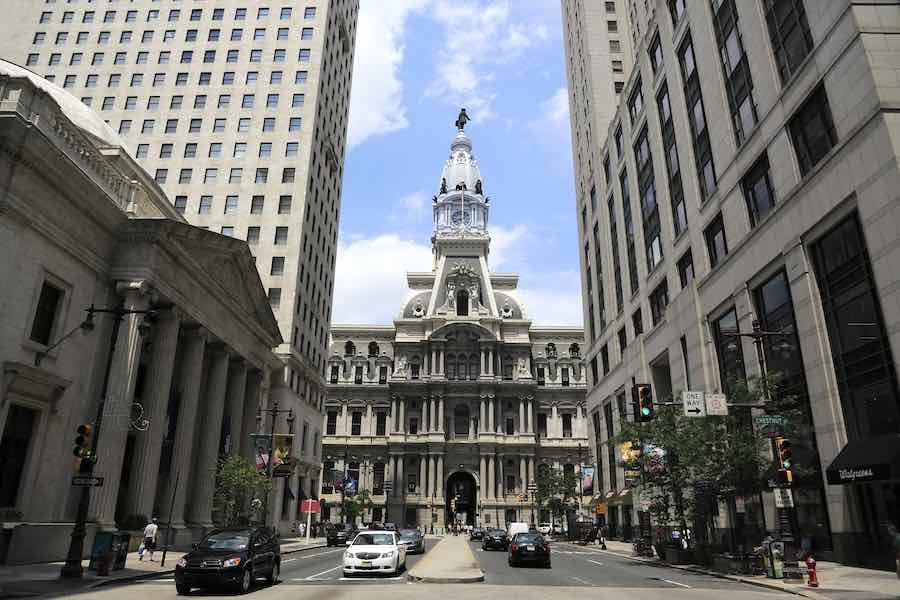These Are the Four Major Takeaways From the City’s $6.2 Billion Budget Deal
There were winners. There were losers. And the next mayor is set up to do some really big things.

City Hall from Market Street (Getty Images)
This year’s budget deal (which Council will vote on formally next week) marks the end of an era. It’s the last budget Mayor Jim Kenney and City Council President Darrell Clarke will oversee, as both of these longtime pols’ City Hall careers are sunsetting in January 2024. Thanks to impressive tax-revenue increases, Councilmembers had more opportunities to champion major proposals. Of course, this meant what was agreed upon for that surplus was good news for some (namely the business community) and disappointment for others (the progressive agenda). Yet this upcoming budget is arguably the fairest we’ve seen in recent years in terms of striking the right balance of aid, incentives and tax cuts.
Here are four major takeaways from the city’s massive budget deal:
The business community gets more (necessary) tax cuts.
This upcoming year, there will be roughly $32 million in tax cuts — namely, reductions in the wage tax and the business-income and receipts taxes. Progressive politicians and organizations argue that this benefits wealthy corporations and hurts efforts to provide necessary social services to the public. Proponents from the business community argue that such cuts are needed to attract businesses to the city.
“We are putting millions back into the pockets of mega-corporations,” Councilmember Jamie Gauthier, the lone elected official to vote against the budget, told the Philadelphia Inquirer at the time. “This budget is a slap in the face to our working-class Black and brown residents who begged City Hall for the resources they need to live in clean, green and safe blocks.”
I understand Gauthier’s frustration, but I do think it’s out of step with the current state of Philadelphia. We’re the poorest big city in America, yet we have one of the nation’s highest wage taxes. It’s intellectually dishonest to act like mega-corporations are running amok in the city getting millions. Other than Comcast, Rite Aid and Aramark — the only Fortune 500 companies headquartered in Philly — I doubt many Philadelphians can name any major “mega-corporations” here. Philly could be so much better at attracting serious corporate investment. Isaiah Thomas’s and Katherine Gilmore Richardson’s push for aggressive tax reductions may help make the city more business-friendly at a time when we need all sectors (private and public) to step up to improve Philly.
Police funding increased — but not in the way you might assume.
Yes, there will be a $55 million increase in funding to the Philadelphia Police Department — but the money isn’t being dumped on adding more cops to what feels like a black hole of accountability. Instead, most of this money is going toward previously agreed-to pay raises in the city’s contract with the police union (Fraternal Order of Police). Other notable funding increases will go to improving the forensics lab, to help it solve cases. What makes this news promising is that outside of its contractual obligations, the city doesn’t seem to be putting money toward fear-mongering initiatives that haven’t yielded much in terms of results. Here’s the reality: It seems impossible right now to see the city reducing the police budget at a time when many still view the department as essential to addressing our gun-violence crisis. However, whereas other major cities, such as New York City and Chicago, have drastically increased their budgets, Philly’s increases are moderate, even as we heard lots of tough-on-crime rhetoric during the primary cycle. With a budget of $855 million, the department still remains the best-funded in the city.
Big quality-of-life proposals bombed — but there’s still some hope left.
Councilmembers Gauthier and Kenyatta Johnson had major plans to improve the quality of life for Philadelphians — but a lot of that came to a screeching halt. After proposing that the city spend a whopping $72 million addressing issues like illegal dumping and cleaning vacant lots, Gauthier got a disappointing $5.5 million toward those goals. Meanwhile, Johnson proposed $40 million more toward anti-gun-violence initiatives — and he, too, got just $5.5 million for his plan. The good news is that Gauthier and Johnson still have hope for more funding. Every fall, Councilmembers can push for more money for their causes during the mid-year budget transfer process — an avenue for Councilmembers to push for initiatives they care about.
Our next mayor is set up for fiscal success — let’s hope that mayor spends wisely.
Right now, the fiscal climate is actually looking really good for Philadelphia. Our 100th mayor is entering an administration that’s ripe with opportunity to push a robust agenda. There’s $800 million left of the $1.4 billion in federal aid the city received from the American Rescue Plan Act of 2021, and the next mayor has until the end of 2024 to spend it. Perhaps that’s the not-quite-billion-dollar question we should be asking both mayoral candidates, Cherelle Parker and David Oh, in the months to come: How in the hell do you plan to spend nearly a billion dollars in one year? I personally know how I would.


